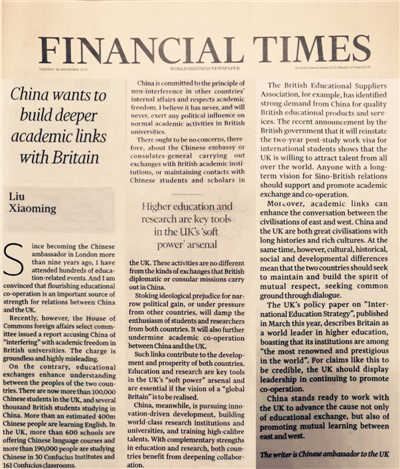|

On 26 November 2019, the Financial Times published a signed article by Ambassador Liu Xiaoming entitled: China wants to build deeper educational links with Britain. The full text is as follows:
Since becoming the Chinese ambassador in London more than nine years ago, I have attended hundreds of education-related events. And I am convinced that flourishing educational co-operation is an important source of strength for relations between China and the UK.
Recently, however, the House of Commons foreign affairs select committee issued a report accusing China of “interfering” with academic freedom in British universities. The charge is groundless and highly misleading.
On the contrary, educational exchanges enhance understanding between the peoples of the two countries. There are now more than 100,000 Chinese students in the UK, and several thousand British students studying in China. More than an estimated 400m Chinese people are learning English. In the UK, more than 600 schools are offering Chinese language courses and more than 190,000 people are studying Chinese in 30 Confucius Institutes and 161 Confucius classrooms.
China is committed to the principle of non-interference in other countries’ internal affairs and respects academic freedom. I believe it has never, and will never, exert any political influence on normal academic activities in British universities.
There ought to be no concerns, therefore, about the Chinese embassy or consulates-general carrying out exchanges with British academic institutions, or maintaining contacts with Chinese students and scholars in the UK. These activities are no different from the kinds of exchanges that British diplomatic or consular missions carry out in China.
Stoking ideological prejudice for narrow political gain, or under pressure from other countries, will damp the enthusiasm of students and researchers from both countries. It will also further undermine academic co-operation between China and the UK.
Such links contribute to the development and prosperity of both countries. Education and research are key tools in the UK’s “soft power” arsenal and are essential if the vision of a “global Britain” is to be realised.
China, meanwhile, is pursuing innovation-driven development, building world-class research institutions and universities, and training high-calibre talents. With complementary strengths in education and research, both countries benefit from deepening collaboration.
The British Educational Suppliers Association, for example, has identified strong demand from China for quality British educational products and services. The recent announcement by the British government that it will reinstate the two-year post-study work visa for international students shows that the UK is willing to attract talent from all over the world. Anyone with a long-term vision for Sino-British relations should support and promote academic exchange and co-operation.
Moreover, academic links can enhance the conversation between the civilisations of east and west. China and the UK are both great civilisations with long histories and rich cultures. At the same time, however, cultural, historical, social and developmental differences mean that the two countries should seek to maintain and build the spirit of mutual respect, seeking common ground through dialogue.
The UK’s policy paper on “International Education Strategy”, published in March this year, describes Britain as a world leader in higher education, boasting that its institutions are among “the most renowned and prestigious in the world”. For claims like this to be credible, the UK should display leadership in continuing to promote co-operation.
China stands ready to work with the UK to advance the cause not only of educational exchange, but also of promoting mutual learning between east and west.

|

